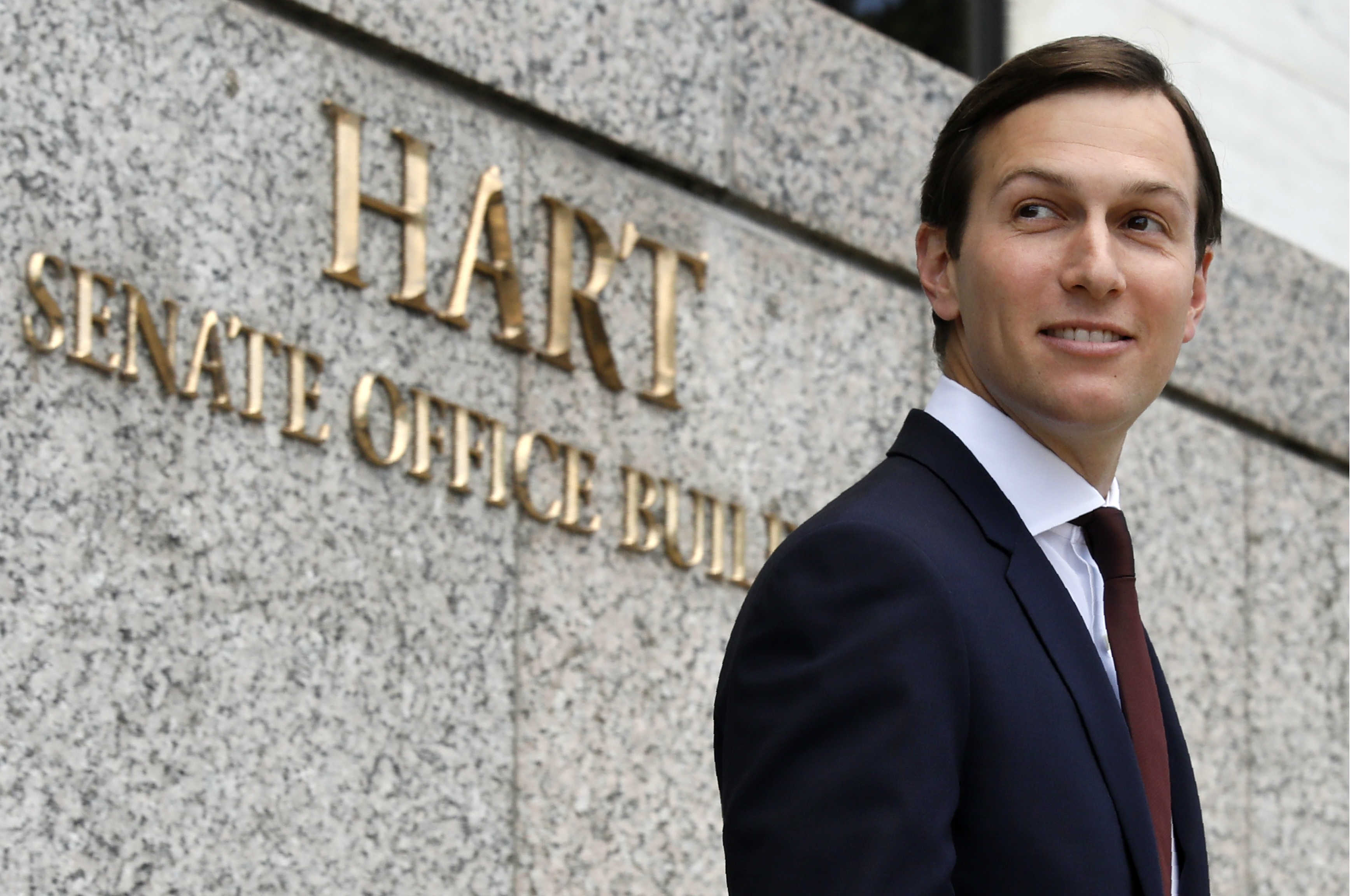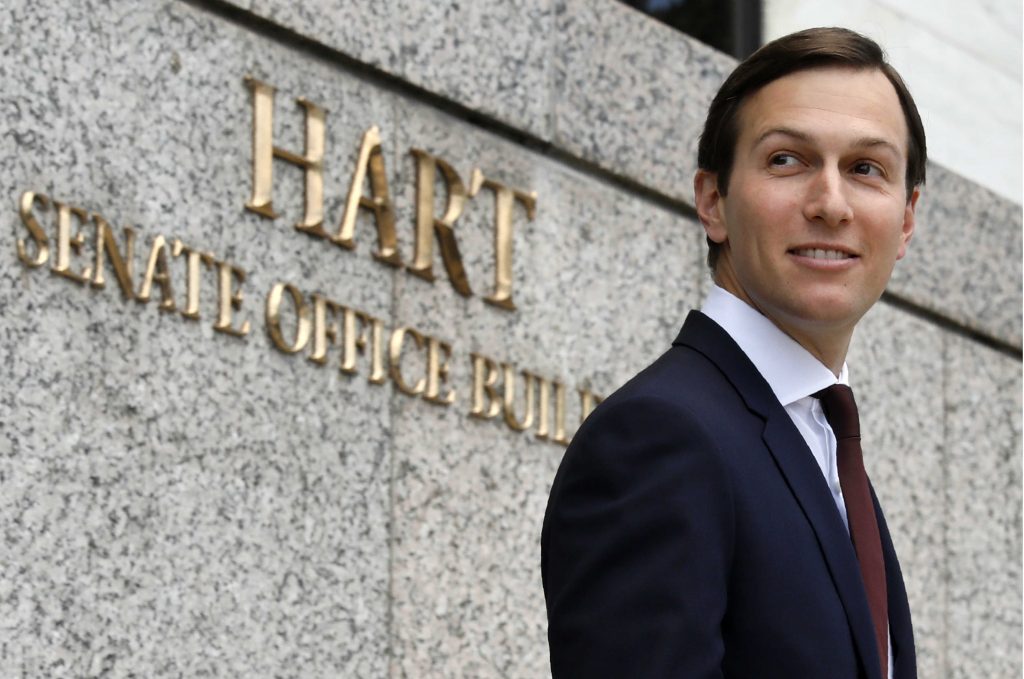 The testimonies of Donald Trump, Jr., Jared Kushner, and Paul Manafort before Congressional investigational committees will be closed to public. Yet they are the highlights of a political crisis that may be deeper than Watergate. In a made-for-TV series, the intrigue connects Washington power politics and espionage with a family saga, and for some comic relief, there’s a comedy of errors based on incompetence and inexperience thrown in.
The testimonies of Donald Trump, Jr., Jared Kushner, and Paul Manafort before Congressional investigational committees will be closed to public. Yet they are the highlights of a political crisis that may be deeper than Watergate. In a made-for-TV series, the intrigue connects Washington power politics and espionage with a family saga, and for some comic relief, there’s a comedy of errors based on incompetence and inexperience thrown in.
The Nixon White House carried out the notorious Watergate break-in and cover-up, but those crimes and misdemeanors were internal. Today, suspicions stretch beyond US borders. Each suspicion needs to be investigated fully and put to rest—or prosecuted. Unfortunately, we have not seen the last of the Russia scandal.
Russia is at the heart of the crisis, and Moscow does not have America’s interests at heart. Since 2005, senior Russian officials have declared that Russia is at war with the West. In his 2007 speech at the Munich Conference on Security Policy, President Vladimir Putin expressed his willingness to change the balance of power in Europe and the world.
President Donald Trump’s Homeland Security Secretary John Kelly and White House Homeland Security and Counterterrorism Advisor Tom Bossert, a former Atlantic Council fellow, have affirmed that Russia hacked both parties’ headquarters and released the information to WikiLeaks. In describing Russian actions as such, Kelly and Bossert contradicted their boss, who can’t rule out, or rule in, Russian interference.
But the record is clear: these were acts of cyber-espionage, cyber-aggression, and covert action. Former CIA and NSA Director Michael Hayden recently tipped his hat to Russian intelligence for the high professionalism of the operations, but also warned that such actions are unacceptable.
It is crucial that the Congressional committees as well as Special Counsel Robert Mueller press on until they get to the truth about Russian involvement in cyber-attacks and election meddling, and establish facts about Americans’ complicity (or lack thereof) in these Russian intelligence operations. Independent investigations distinguish Washington from Moscow, and they should continue without obstruction or interference.
One of the core principles of US law is the presumption of innocence, which is a standard that we must adhere to, yet we must also trust the system, especially an investigation led by someone as experienced and well-regarded as Mueller.
In the meantime, Russia continues to destabilize Europe, including Ukraine. On July 18, the leader of Russian-supported separatists in Donetsk, Alexander Zakharchenko, declared that Ukraine should be destroyed as a country and replaced by a pro-Russian entity called Malorossiya (“Little Russia”). “Malorossiya,” Belarus, and Russia would then create a Slavic Union.
Zakharchenko is a creature of the Kremlin and would not make such a statement without the Kremlin’s approval, although the official Kremlin spokesman said he wanted to “refrain from commenting” until the issue has been examined. Other Russian officials distanced themselves from the idea. But Vladislav Surkov, Putin’s grey cardinal and his point man on Ukraine, expressed support for Zakharchenko’s position.
This statement is alarming on two levels. First, taken to its logical conclusion, it means a big war in Ukraine is inevitable. Second, it suggests that Russia will continue to disregard the sanctity of borders in Europe, as it did in Crimea and Donbas, rolling back the bedrock principles of European security.
Zakharchenko’s statement means Russia will continue destroying the status quo in Europe, which may end in a regional war—or worse.
This is why Congress, in a veto-proof majority, is about to pass the toughest sanctions on Russia so far, in response to the election meddling and aggression in Ukraine. By doing this, Congress is sending a strong message to the Kremlin and to the White House that it will actively check Trump’s Russia policy.
The president’s Russia policy still demands formulation, amplification, and clarification. The Russian official news agency Sputnik announced that Russia is
conducting talks with the United States on cybersecurity, something Trump floated in the meeting with Putin, and then backpedaled. So are we—or are we not—negotiating with Russia over cybersecurity after Russia hacked our elections?
Why is it so difficult to have a dinner conversation with Putin with an American translator and a State Department or NSC note taker present—not just a Russian translator?
And why is it so hard to observe diplomatic and security protocol, especially when it concerns business with Russia?
The United States is a nation of laws. It prospers through the rule of law, government ethics, and transparency. Corruption and opacity will be our demise.
Let’s make America great again by making Washington transparent, upholding ethics, following the rules, and observing the rule of law.
Ariel Cohen is a nonresident Senior Fellow at the Atlantic Council Dinu Patriciu Eurasia Center and director of the Center for Energy, Natural Resources, and Geopolitics at the Institute for the Analysis of Global Security.
Image: White House Senior Adviser Jared Kushner departs following his appearance before a closed session of the Senate Intelligence Committee as part of their probe into Russian meddling in the 2016 US presidential election, on Capitol Hill in Washington, July 24, 2017. REUTERS/Aaron P. Bernstein
